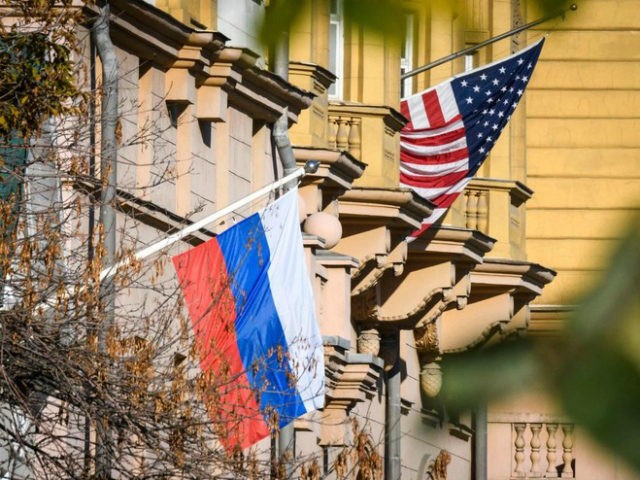China’s state-run media attacked the United States on Monday and Tuesday for announcing its intent to withdraw from the Intermediate-Range Nuclear Forces Treaty (INF) between America and the Soviet Union, warning that an end to the 1987 deal may “trigger a global arms race.”
In remarks Tuesday, China’s Foreign Ministry also warned that it would not bend to American “blackmail,” implying that Beijing felt targeted by the decision to withdraw from the deal.
The INF limits the development of nuclear technology, including nuclear missiles, by Washington and Moscow. President Donald Trump announced on Saturday his intention to withdraw from the treaty, stating that Russia has repeatedly violated the treaty and adding, “If Russia’s doing it and if China’s doing it and we’re adhering to the agreement, that’s unacceptable.”
China is not a part of the INF and had developed military nuclear technology without impediment since the 1987 deal was signed. Opponents of staying in the INF contend that China’s uninhibited development of such weapons poses a threat to both Russia and the United States, who remain bound to each other.
National Security Adviser John Bolton is currently in Moscow for discussions with senior defense officials on how to terminate the deal.
China’s Global Times newspaper claimed in a column Monday that the United States has weakened the treaty, as it “increasingly disregards Russia and hurries to get rid of the treaty.” It warned that, without the Reagan-Gorbachev agreement, “decades of global efforts on arms control and disarmament negotiations would come to naught.”
“The US withdrawal would aggravate the strategic imbalance in today’s world. It could trigger a global arms race and add instability to international and regional security,” according to the Times. “The US doesn’t want to be subject to any constraints, duties or responsibilities. Such a US is taking the world into uncharted waters.”
The piece went on to defend the Chinese government, claiming that “military might and strategic nuclear power have never played an outstanding role in China’s foreign relations.”
China has repeatedly used the People’s Liberation Army (PLA) to intimidate its neighbors, particularly in the South China Sea, where it has illegally colonized territory belonging to Vietnam and the Philippines by placing military assets in the Spratly and Paracel Islands. The Communist Party has repeatedly denied having done so, however, claiming that, instead, it has developed search and rescue technology to prevent another incident like the disappearance of Malaysia Airlines flight 370.
On Monday, Foreign Ministry spokeswoman Hua Chunying lamented the end of the INF. “It is still highly relevant today. Unilaterally withdrawing from the treaty will cause many negative effects,” Hua predicted.
She went on to add that arguments using China as a reason to withdraw from the treaty were “totally wrong.”
“Unilaterally withdrawing from the treaty will cause many negative effects. The US side should prudently handle the issues related to the treaty,” she added. “It is even more wrong to make an issue out of China on withdrawing from the treaty. We hope that the US side can shoulder its responsibility and think twice before its pullout.”
Hua attacked the United States more adamantly on Tuesday, arguing that, for China, “it is very hard to grasp the meaning” of statements suggesting that China’s military belligerence makes the INF obsolete.
“In its defense policy, China adheres to the principle of protecting its interests in the field of security. We won’t tolerate blackmail in any form,” she added. “Once again, we urge the United States to stop going against the flow. It is necessary to think thrice and take action only after that.”
Bolton met with several senior Russian officials in Moscow Tuesday and is scheduled to meet with President Vladimir Putin at press time. Speaking to reporters Tuesday morning, he praised his experience in Russia so far.
“I think they understand our reasons quite clearly, some of which I think they might fully appreciate from their own strategic perspective,” Bolton reportedly told CNN. “I think their preference is that they have stayed in this and we do not withdraw, but we are giving them the reasons why we are going do it.”
Bolton described his conversations with Russian officials as “very professional, very work-like.”
“Technology has changed, your strategic reality has changed, and we both have to deal with it,” he added.
Russian presidential spokesman Dmitry Peskov also spoke to reporters on Tuesday, sounding much less cordial than Bolton.
“Certainly, there are bottlenecks. But ruining the treaty in a situation where even hints at concluding a new one do not exist is something that we do not welcome,” Peskov told reporters. He added that Russia was particularly concerned that “there are no prospects for the emergence of a new document” and called the withdrawal “a pretty risky stance” with no counteroffer on a new treaty.
He concluded, however, that Moscow would wait to hear “the explanations that will be presented to Putin on that score.”
Some Russian politicians appear to agree that China’s exclusion from such a treaty is a problem for both America and Russia.
“The criticism of the INF Treaty that it imposes restrictions only on the United States and Russia is justified in general and our country has also voiced a similar position many times in the past,” the head of the Foreign Affairs Committee in Russia’s upper legislative house Konstantin Kosachev said in a Facebook post on Tuesday. “The treaty should become universal.”

COMMENTS
Please let us know if you're having issues with commenting.